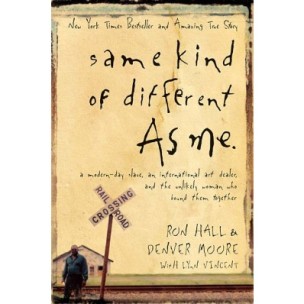For today’s blog post I’m highlighting two sentences from Same Kind of Different As Me, by Ron Hall and Denver Moore with Lynn Vincent. You may recall that I read this nonfiction book in September and commented about it in my October 2, 2017 blog post, Some Great September Reads.

“ʻEver man should have the courage to stand up and face the enemy,’ I said, “ʻcause ever person that looks like a enemy on the outside ain’t necessarily one on the inside. We all has more in common than we think.’” – Homeless man Denver Moore speaking in Same Kind of Different As Me, by Ron Hall and Denver Moore with Lynn Vincent.
Lessons to learn
We can all probably learn many lessons from Same Kind of Different As Me. I think the theme of the book is that under the pigment shade of our skin, we are all the same. When we judge others based on their outward appearance, we often rob ourselves of an opportunity for making a new friend, or at the very least, an opportunity to have cordial interaction with a stranger.
I’m not naïve enough to advocate that we just approach strangers willy-nilly and befriend them. There are people out there who are up to no good; however, that is not a good excuse for being afraid of everyone who does not look like we do.
Polarization in America
In our current polarized population in the United States, it seems we’re becoming more a nation of “they” and “us” than the “melting pot” I grew up learning about in history classes. We tend to fear the unknown. As long as our fellow citizens whose skin is a different shade from our own are seen as people to be feared or as an enemy, we will continue to be a divided people and none of us will be able to reach our potential. Our nation certainly won’t reach its potential until we learn how to get along with one another.
This applies to people of another racial or ethnic background, but it also applies to people who espouse political stances different from our own. I’m old enough to remember when Democrats and Republicans could agree to agreeably disagree. Now it seems that neither side has any desire to try to reach common ground on any issue.
Discovering the fun of compromise
As a political science major in college, one of the courses that still stands out in my memory is the one called The Legislative Process. Going into the course, I wasn’t very excited. I had never been a political person. I was studying political science to prepare myself for a career in city management (or so I thought.) Much to my surprise, The Legislative Process turned out to be an invigorating course.
Class members were arbitrarily divided into two groups. Each group was assigned a piece of legislation they had to fight to get passed. Of course, the two proposed laws were polar opposites of each other. The two groups had to work together and create a compromise bill.
I recall that one day when the bell rang and we were supposed to leave the classroom so another class could come in, the professor struggled to get us to stop debating and leave. Although we knew we could pick up where we left off at our next class meeting two days later, we were so wrapped up in the process – and HAVING SO MUCH FUN – that we didn’t want to stop. I have forgotten many of the intricacies of that political science course, but I accidentally learned that compromise can be fun.
The “takeaway”
Let’s stop being afraid of one another and start letting ourselves find the fun and joy that come from interacting with one another and finding common ground. And when we cannot readily find common ground, let’s remember how – or learn how – to compromise.
Find a place for compromise in your own life and work to get compromise back into the vocabulary and mindset of our local, state, national, and world leaders.
When I sat down to write about those two sentences from Same Kind of Different As Me, I thought I knew where I was going. I anticipated writing a short, maybe 300-word blog post. Like life and the legislative process, though, writing has many surprises. One of them is that this blog post is approaching 1,000 words.
Until my next blog post
I hope you have a good book to read. David Ignatius’s new thriller, The Quantum Spy is in transit to me at the public library. I have enjoyed his other novels, so I’m looking forward to reading this one.
After being overwhelmed this year with books I wanted to read, I plan to cut back somewhat on my reading for a while and spend more time on my writing. It is said that one has to read a lot in order to be a good writer.
I’ve learned a lot from the many good books I’ve read in 2017, and now I look forward to putting some of that new knowledge into practice by getting back to work on my historical novel manuscript with the working title, The Spanish Coin.
It’s been fun to work on my manuscript’s outline the last few days. There’s another surprise! I never thought I would use the words “outline” and “fun” in the same sentence. Outlining a work of fiction is hard work but, when I’m in the proper frame of mind, it can also be fun.
If you are a writer, I hope you have found the perfect balance between reading and writing. I hope you have productive writing time.
Janet

